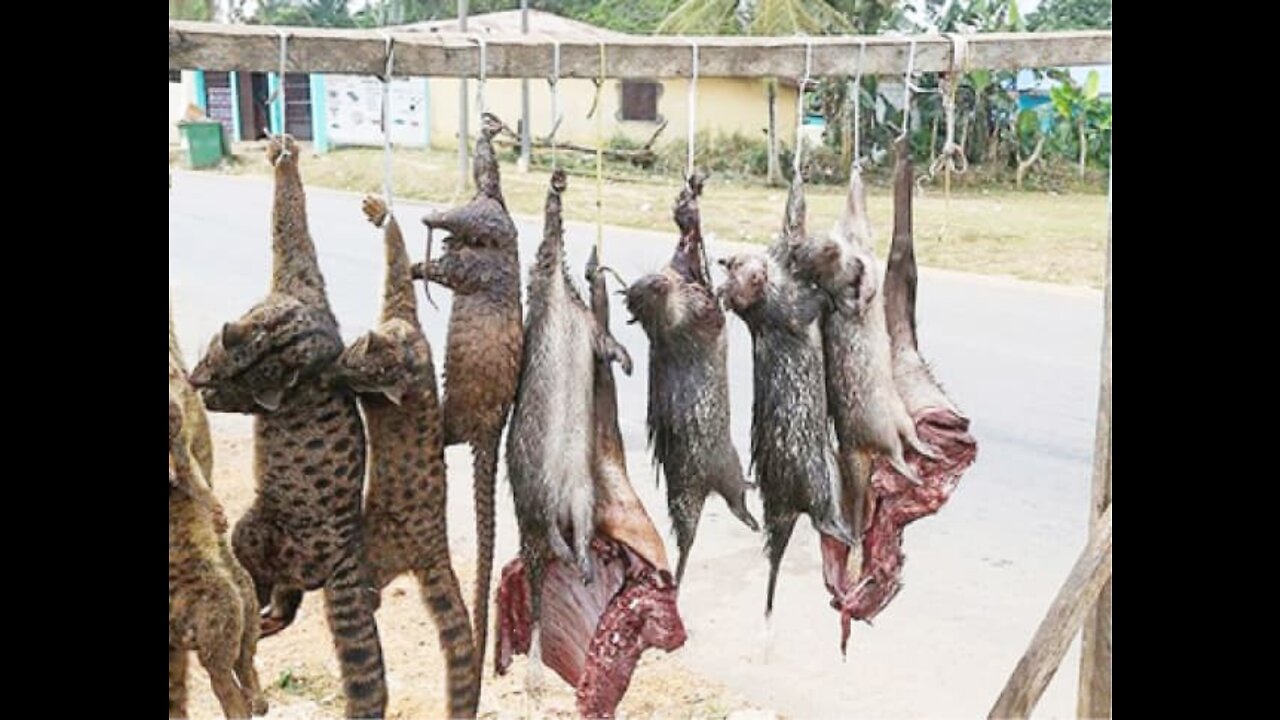Premium Only Content

SHOCKING -EXTREMELY BARBARIC RAREST ANIMAL CRUELTY (AFRICA BUSHMEAT TRADE)
The craving for bushmeat among Africans has continued to threaten wildlife populations on the continent as well as increase in the risks of zoonotic disease transmission among humans.
The trade in wildlife particularly the killing of protected animal species and their body parts have continued to deplete their population while some have already gone into extinction for a long time.
It has been discovered that there are few surviving cheetah, rhinos, giraffes in africa and less than 500 lions, 1000 gorillas, 500 elephants left in the wild as a result of sustained and uncontrolled killings and trade in wild animals and their body parts.
Bushmeat brings humans into close contact with wildlife and creates a prime path for the transmission of diseases like Ebola, Lassa fever and other new emerging infectious diseases.
It also serves as an important food resource for poor people, particularly in rural areas but there is a rising appetite for bushmeat consumption among urban residents, which increased its demands.
According to the World Health Organisation (WHO), 75 per cent of all emerging infectious diseases in the last decade originated from animals.
It revealed that outbreaks of Ebola, HIV and SARS among others have been linked to the wild or bushmeat trade, with COVID-19 also potentially spread through this activity and causing tremendous health and economic impacts.
Africa has flourishing unregulated bushmeat markets in major cities selling killed and live wild animals increasing close contact between the animals and humans, thereby, increasing the risks of new disease introduction and transmission.
A commercial trade serving large urban centres is said to pose significantly higher risk and larger outbreaks than subsistence use in rural areas. The 2014-2015 Ebola outbreak in West Africa killed over 11,000 people.
Several governments launched large-scale mass media campaigns to discourage people from consuming bush meat, which made consumers adjust their preferences and stay away from some bush meats like fruit bats and monkeys switching to other alternatives while bush meat sellers record poor sales during the epidemic.
Barely three years later, sales of bushmeat have rebounded in Africa, following the rising demand and flourishing illegal wildlife trade, which continued to thrive, fuelling trade in protected species like elephants and pangolins among others.
It also stated that no person shall hunt, capture, trade in or otherwise deal with an animal species specified in the Second Schedule to the Act except if the person is in possession of a license issued under the Act, which sets out conditions of licenses and permits.
President of WildAid, Peter Knights OBE at the recent launch of a public awareness conservation campaign against illegal demand for and wildlife trade held in accra, disclosed that most west African countries have no surviving cheetahs, rhinos, giraffes and has fewer than 50 lions, 100 gorillas, 500 elephants and 2,300 chimpanzees left in the wild.
He said, one species like pangolins are either endangered or on the brink of extinction adding that other species declining in population include; crocodiles and antelope species like drinkers, which are widely found in bushmeat markets across the country.
Despite ongoing conservation efforts, poaching for body parts and meat along with habitat loss from deforestation, infrastructure development and agricultural expansion threaten wildlife in Africa
The organisation believes that ‘When the buying stops, the killing can stop too.’
The consumption of bushmeat according to the survey overlaps with the illegal trade networks, fuelling the trade in protected species like elephants and pangolins.
It was further revealed that grasscutter (cane rat or Thryonomys swinderianus) and antelopes such as bushbuck, red-flanked duiker, bay duiker, Maxwell’s duiker, black duiker, Ogilby’s duiker, yellow-backed duiker and dwarf antelope were the most commonly eaten species.
The Endangered Species (Control of International Trade and Traffic) (Amendment) Act, 2016 and several other federal and state laws that impose penalties on hunting and trading of species like pangolins, rock pythons, elephants and some antelope species, were found to be poor deterrents on consumer behaviour.
“Overexploitation of wildlife for eating and illegal trafficking is one of the biggest threats to biodiversity loss in west africa. Africa is also a major player in the global illegal wildlife trafficking as illegal trade is decimating populations of elephants, pangolins, rhinoceros, sharks, chimpanzees, gorillas and numerous tree species in Africa.”
He added that the forest serves as a major source and raw material for most indigenous and orthodox drugs worldwide saying deforestation will lead to loss of important tress of medicinal properties that can be used to cure most tropical diseases.
-
 1:47:36
1:47:36
Glenn Greenwald
5 hours agoJD Vance and Rand Paul Clash on Due Process: War on Terror Echoes; Has the U.S. Given Up on Confronting China? Ben Shapiro's Latest Falsehoods About Israel | SYSTEM UPDATE #510
83K65 -
 LIVE
LIVE
RaikenNight
3 hours ago $0.14 earnedExploring the Galaxy of No Mans Sky
144 watching -
 LIVE
LIVE
Spartan
5 hours agoRanked and Expedition 33 (NG+4 and all enemies Set to 10x health)
82 watching -
 LIVE
LIVE
Jokeuhl Gaming and Chat
8 hours agoDARKTIDE - Warhammer 40k w/ Nubes and AoA
102 watching -
 2:19:56
2:19:56
Nerdrotic
15 hours ago $1.07 earnedNerdrotic Nooner 513
40.1K2 -

BigTallRedneck
4 hours agoRANKED FINALS W OMEGA
12.3K -
 LIVE
LIVE
Eternal_Spartan
12 hours ago🟢 Eternal Spartan Plays Final Fantasy 7 Rebirth Ep. 3 | USMC Vet | Join the Best Chat on Rumble
68 watching -
 1:39:52
1:39:52
megimu32
3 hours agoOTS: Ace Ventura & The Death of 90s Comedy
14.8K8 -
 1:14:30
1:14:30
We Like Shooting
16 hours ago $1.13 earnedDouble Tap 426 (Gun Podcast)
11.8K2 -
 4:32:32
4:32:32
Meisters of Madness
6 hours agoWuchang Returns with Madness & Ranked Finals
5.68K